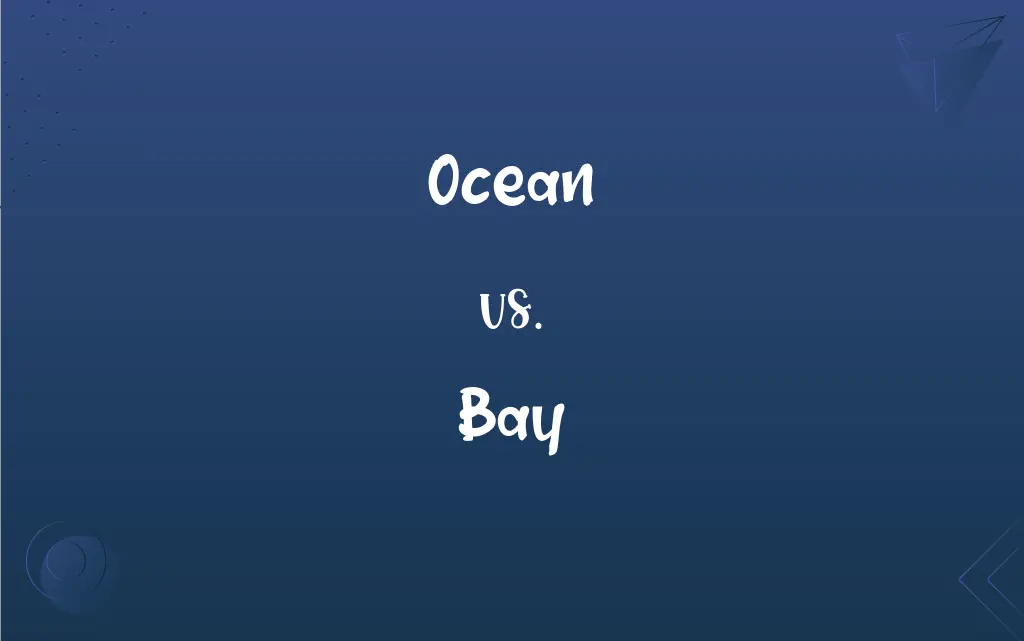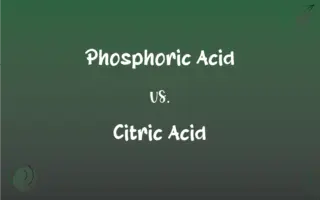Ocean vs. Bay: What's the Difference?
Edited by Aimie Carlson || By Janet White || Published on December 13, 2023
"An ocean is a vast and expansive body of saltwater, while a bay is a smaller, partially enclosed area within an ocean or sea, often sheltered by land."

Key Differences
Oceans are immense bodies of saltwater, covering a major part of the Earth's surface. Bays, in contrast, are smaller bodies of water, partially enclosed by land and connected to an ocean.
The ocean is characterized by its vast size and depth, often spanning thousands of miles. A bay, however, is typically much smaller and shallower than an ocean, offering a more contained and sheltered environment.
Oceans play a crucial role in the global climate system and marine biodiversity. Bays, while smaller, can be ecologically significant, providing habitats for various marine species and acting as important fishing grounds.
The ocean's vastness supports a wide range of marine life and ecosystems. In contrast, a bay often serves as a safe harbor for boats and a recreational area for swimming and other water activities.
Oceans are major components of the Earth's hydrosphere, while bays are often landmarks of coastal geography, characterized by their unique shape and location relative to the surrounding land.
ADVERTISEMENT
Comparison Chart
Size
Extremely large, covering vast areas
Smaller, enclosed areas within oceans or seas
Depth
Generally very deep
Relatively shallow
Enclosure
Open and vast expanses of water
Partially enclosed by land
Ecological Role
Supports diverse marine ecosystems
Provides habitat, often more sheltered
Usage
Navigational routes, climate influence
Harbors, recreational activities
ADVERTISEMENT
Ocean and Bay Definitions
Ocean
A vast body of saltwater covering a significant part of Earth's surface.
The Pacific Ocean is the largest and deepest ocean on Earth.
Bay
A body of water partially enclosed by land and connected to a larger sea or ocean.
San Francisco Bay is known for its iconic bridge and scenic beauty.
Ocean
An extensive, continuous mass of saltwater.
The Indian Ocean's warm waters are vital for marine biodiversity.
Bay
An indentation of a shoreline, usually smaller than a gulf.
The bay's serene waters attracted many kayakers.
Ocean
The interconnected system of Earth's oceanic waters.
The ocean's currents play a critical role in global climate.
Bay
A recessed coastal body of water.
Hudson Bay in Canada is a significant geographical feature.
Ocean
A large, principal expanse of saltwater.
The Arctic Ocean is the smallest and shallowest of Earth's oceans.
Bay
A small, sheltered inlet or cove.
The bay was calm, providing a perfect spot for fishing.
Ocean
A principal division of the world's saltwater bodies.
The Atlantic Ocean is known for its significant role in history and trade.
Bay
A coastal inlet often surrounded by land on three sides.
The bay offered a natural harbor for the local fishing boats.
Ocean
The entire body of salt water that covers more than 70 percent of the earth's surface.
Bay
A body of water partially enclosed by land but with a wide mouth, affording access to the sea
The Bay of Biscay.
Ocean
Abbr. Oc. or O. Any of the principal divisions of the ocean, including the Atlantic, Pacific, Indian, Arctic, and Southern Oceans.
Bay
An area of land, such as an arm of prairie partially enclosed by woodland, that resembles in shape or formation a partially enclosed body of water.
FAQs
How many oceans are there?
Five major oceans: Pacific, Atlantic, Indian, Southern, and Arctic.
Do bays have tides like oceans?
Yes, bays experience tides influenced by the ocean.
What defines an ocean?
A vast body of saltwater covering a large part of Earth's surface.
What is a bay?
A smaller, partially enclosed body of water along a coastline.
Is a gulf larger than a bay?
Generally, a gulf is larger and more deeply indented than a bay.
Can bays be found in oceans?
Yes, bays are smaller areas within or adjacent to an ocean.
Are oceans deeper than bays?
Generally, oceans are much deeper than bays.
Do all oceans connect?
Yes, the world's oceans are interconnected.
Can bays be formed by erosion?
Yes, erosion and other geological processes can form bays.
Do oceans have currents?
Yes, oceans have complex systems of currents.
Can oceans influence climate?
Yes, oceans play a crucial role in global climate patterns.
Are there freshwater oceans?
No, oceans are primarily saltwater bodies.
Can bays have beaches?
Yes, many bays have beaches along their shorelines.
Can you swim in an ocean?
Yes, but it's important to be aware of safety, like currents and wildlife.
Are bays important for marine life?
Yes, they often provide sheltered habitats and breeding grounds.
Are bays used for commercial purposes?
Yes, they often serve as harbors and for recreational activities.
Are bays affected by pollution?
Yes, bays can be impacted by pollution, especially near urban areas.
Is the salinity of a bay different from an ocean?
It can be, especially if the bay receives freshwater inflow.
Do oceans support biodiversity?
Yes, oceans are home to a vast array of marine species.
Is fishing common in bays?
Yes, many bays are popular for fishing due to their rich marine life.
About Author
Written by
Janet WhiteJanet White has been an esteemed writer and blogger for Difference Wiki. Holding a Master's degree in Science and Medical Journalism from the prestigious Boston University, she has consistently demonstrated her expertise and passion for her field. When she's not immersed in her work, Janet relishes her time exercising, delving into a good book, and cherishing moments with friends and family.
Edited by
Aimie CarlsonAimie Carlson, holding a master's degree in English literature, is a fervent English language enthusiast. She lends her writing talents to Difference Wiki, a prominent website that specializes in comparisons, offering readers insightful analyses that both captivate and inform.








































































